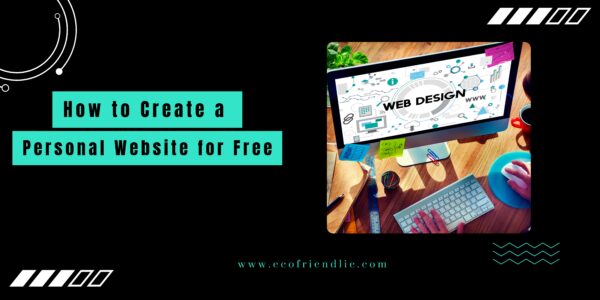How to Create a Personal Website for Free: A Beginner’s Guide
Creating a personal website doesn’t have to come with a hefty price tag. Thanks to a variety of free tools and platforms, you can easily design a professional-looking site without spending anything. Whether you’re looking to showcase your portfolio, start a blog, or build your professional presence online, this guide will show you how to launch your personal website for free.
1. Clarify Your Website’s Purpose:
The first step in creating your personal website is to define your goals. Ask yourself:
- Do you want to showcase your work or portfolio?
- Are you starting a blog to share insights, travel experiences, or hobbies?
- Is this a personal brand site to help with your career or networking?
Knowing your purpose upfront will help guide your decisions throughout the process.
2. Select a Free Website Builder:
There are many free website builders available that offer customizable templates and easy-to-use features. A few popular choices include:
- Wix: User-friendly with drag-and-drop options and a broad selection of free templates.
- WordPress.com: Great for blogs and personal sites, offering flexibility and a huge range of themes.
- Weebly: Simple to use, with customizable layouts to suit different site needs.
Each platform comes with different strengths, so take your time to explore which one suits your goals best.
3. Choose Your Domain Name:
A domain name is essentially your website’s address (e.g., yourname.com). Most free website builders provide a subdomain, which might look like yourname.wixsite.com or yourname.weebly.com. This is perfect for those looking to launch for free. However, if you want to upgrade later, you can always purchase a custom domain name.
When picking a domain:
- Keep it short and easy to remember.
- Incorporate your name or something relevant to your niche.
- Avoid using numbers or complex symbols to make it easier to share.
4. Customize Your Website Design:
Once you’ve selected your template, it’s time to make it your own. Each website builder provides several free templates designed for different purposes:
- Portfolio: Choose a clean and visually striking layout to showcase your work.
- Blog: Opt for a template that makes reading easy and organizes content well.
- Professional site: Select a sleek, minimal design that keeps the focus on your expertise.
Personalize your chosen template by adjusting fonts, colors, and layout. Add your own images and a compelling “About” section to give visitors a sense of who you are.

5. Add Key Pages:
Every website should have essential pages that provide a complete user experience:
- Home Page: Introduces your site and gives an overview of what visitors can expect.
- About Page: Share your story, background, or mission here.
- Portfolio or Blog: This is where you’ll showcase your work or post your content.
- Contact Page: Make it easy for visitors to reach you by adding contact details or a form.
These core pages will structure your site and make it easier for visitors to navigate.
6. Optimize for Mobile Devices:
With so many users browsing from their phones, having a mobile-friendly site is essential. Most free website builders ensure that your site is responsive, meaning it automatically adjusts to different screen sizes. Double-check how your site appears on mobile and tablets to make sure it looks great on any device.
7. Boost Visibility with Basic SEO:
You want people to find your site, and Search Engine Optimization (SEO) is key to making that happen. Here are a few tips to improve your site’s visibility:
- Use targeted keywords: Include relevant keywords in your page titles, descriptions, and content.
- Optimize loading speed: Make sure your site isn’t weighed down by large images or unnecessary features.
- Create clear page URLs: Descriptive URLs help search engines understand your content better.
Most website builders offer built-in SEO tools or guides to help improve your rankings.
8. Publish and Share Your Site:
Once your website is complete, hit publish! Your website is officially launched and open to the public.But don’t stop there—spread the word:
- Share your website on social media platforms.
- Add the URL to your email signature.
- Join online communities that match your niche and promote your site.
The more places you share your site, the more visitors you’ll attract.
9. Keep Your Website Updated:
A website isn’t a one-and-done project. Keep it fresh with regular updates. Whether it’s new blog posts, updated portfolio pieces, or tweaking your design, frequent updates will keep visitors engaged and improve your site’s relevance in search engines.
Final Thoughts:
You don’t need a hefty budget to create a high-quality personal website. With the right tools and a bit of creativity, you can design a space that reflects your personality and goals. Define your purpose, choose the best platform for your needs, and start building—your online presence awaits!
FAQs:
1. Is it possible to create a personal website without any cost?
Yes, many platforms allow you to design and publish a personal website for free. Services like Wix, WordPress.com, and Weebly offer free plans that give you access to basic website-building tools. While these plans may have certain limitations, they are more than sufficient for creating a functional, attractive personal site.
2. What is the difference between a subdomain and a custom domain?
A subdomain is an extension of a website builder’s main domain (e.g., yourname.wixsite.com), offered free of charge. A custom domain is a personalized URL (e.g., yourname.com) that can enhance your site’s professional appeal. Although subdomains are free, you can always upgrade to a custom domain later for more branding control.
3. Can I customize a free website?
Yes, even with free plans, you can significantly customize your site. Platforms like Wix, WordPress.com, and Weebly provide a variety of templates and customization options, allowing you to change colors, fonts, layouts, and images. Though premium plans offer advanced customization, free plans still allow you to create a site that reflects your personal style.
4. Is a free website suitable for professional use?
Definitely! Free websites are great for professional portfolios, personal blogs, or resumes. As long as you keep the design clean and professional, you can use free tools to build an impressive site. If you need more advanced features or want to remove ads and platform branding, you can consider upgrading to a paid plan later.
5. Which platform should I choose for a free personal website?
Choosing the right platform depends on your goals.
- Wix is ideal for users looking for design freedom with drag-and-drop simplicity.
- WordPress.com is a popular choice for bloggers and content creators.
- Weebly is great for those who want an easy-to-use platform with flexible design options.
Evaluate the features of each platform to find the one that aligns with your website’s purpose.
6. Can I upgrade my free website later?
Yes, Many free website builders provide the opportunity to upgrade. Upgrading gives you access to more storage, removes ads, provides a custom domain, and unlocks advanced features like e-commerce or custom design elements. You can start with a free plan and scale as your needs grow.
7. Will my website work on mobile devices if it’s free?
Yes, most website builders automatically optimize your website for mobile devices, ensuring that your site adjusts to different screen sizes. You can preview how your website looks on mobile and make necessary changes to improve the user experience across devices.
8. Do I need coding skills to create a free website?
No, free website builders are designed for users of all skill levels, with no coding knowledge required. Drag-and-drop editors and pre-made templates make it simple to design your site. Most platforms also provide step-by-step guides, so you can focus on the content and style without worrying about technical details.
9. Will my free website appear on search engines?
Yes, your free website can be indexed by search engines like Google. However, to improve your visibility, you’ll need to focus on basic SEO practices, such as using keywords, writing optimized page titles, and ensuring fast page loading times. Most builders also offer basic SEO tools to guide you in optimizing your site.
10. Can I add a blog to my free personal website?
Yes! Blogging is a great way to engage visitors and regularly update your site. Platforms like WordPress.com and Wix allow you to create a blog section on your website. You can add and categorize posts, optimize them for search engines, and even enable comments, all on the free plan.
11. What are the downsides of using a free website?
While free plans offer great functionality, there are some limitations:
- You’ll have to use a platform-branded subdomain.
- Free plans may display ads on your site.
- There are limits to storage and bandwidth.
- Customization options may be fewer than on paid plans.
These limitations can often be addressed by upgrading to a premium plan.
12. How can I attract visitors to my free website?
Once your website is live, promote it by sharing it on social media, adding it to your email signature, and engaging with online communities in your niche. SEO strategies like optimizing content with keywords and building backlinks will also help increase traffic to your site over time.
13. Can I link my social media accounts to my free website?
Yes, most free website builders allow you to integrate social media icons or links, directing visitors to your profiles on platforms like LinkedIn, Instagram, Twitter, or Facebook. This is a great way to build a cohesive online presence and make it easier for people to connect with you.
14. Can I update my website after it’s published?
Yes, your website is always editable. You can log in anytime to add content, update pages, or refresh your design. Keeping your site up to date with new blog posts, project work, or announcements is important for maintaining an active online presence.
15. Is my free website secure?
Most free website builders provide basic security, including HTTPS encryption, which protects data exchanged between your site and its visitors. However, advanced security features like backups and malware protection might require upgrading to a paid plan. Always use strong passwords to secure your website account.




